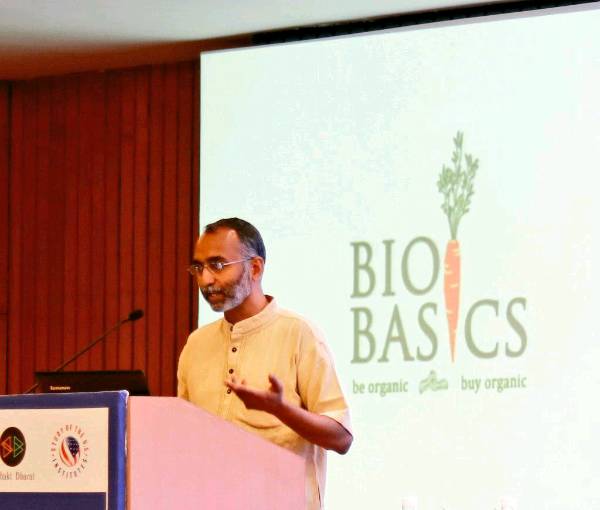Today in Changemakers, we are joined by Ramesh Chandran and Sri Davi Lakshmi Kuti, founders of Bio Basics, an Ecoventure based out of Koimbator that works with farmers to home delivery organic products ranging from fresh produce to whole foods. Their mantra is beef organic Biorganic. And I think that says it all. All of these products are grown, processed, stored and transported without direct use of chemicals. So a bit of background here

@changemakers · 0:18
Also Ramesh I am super curious to know why Koimba tour for Bio Basics. So what was it about Namakai that made you choose the city for your venture into organic farming? Is there any interesting story there for us

Ramesh Chandran
@Ramesh1307 · 4:59
And evenings we would just sit by and then we talk about the issues, the farming issues, the farmer issues, the issues with genetic modification of crops, the issues with pesticides and the breaking down of the food system. So all this started around 2004, while we were settling in the US and we continued for some time. So 2007, we got an opportunity to come to India as part of my professional career itself. So we came down here
Swell Team
@Swell · 0:15
Sreedevi Lakshmi Kutty
@Devi · 2:35
So to the question, why Coimbato it is pure happens then we didn't plan to be in Quebec. We had bought some land in Polarcy around 2007. Yeah, in between our US and Netherlands and we were looking for a house somewhere around a little distance from the land, preferably in Kerala because we're both from there. But a friend of ours who's an environmentalist of note who actually founded the Salimali Center for Ornithology here doctor vs. V. Ramesh

@changemakers · 0:29
Thank you so much for that Shirelian Ramesh. So Bio Basics is not just about selling organic produce. It's more about an EndToEnd ecosystem that covers sourcing, sustainable prices, practices, fair trade, and advocacy for policy changes. Given your background in the corporate world, how did you go about developing a good understanding of these facets, to be able to implement them here

Ramesh Chandran
@Ramesh1307 · 4:57
Then we also were talking to somebody who has been advising us on actual technical side of organic agriculture and sundaramana here. He's based out of Sarah team, and he told us when we went with him and all that. And like I said, we were talking to a lot of these people. And so we asked him, what do we need to do to solve the problem? How can we get the consumers and farmers onto organic farming and organic food?
Sreedevi Lakshmi Kutty
@Devi · 2:57
Okay, now we want broccoli the year out. Let's produce it. That's why chemical farming comes in it. So what we are saying is, yeah, we have Borderland the year round so why don't we try eating? That is what we're trying to do

Ramesh Chandran
@Ramesh1307 · 3:45
One of the things which I personally feel, if you look at all the organic players in the market today, one of the things that is missing, and that is another gap that we've identified is that people don't spend time educating the consumer. Why do you need to use so many varieties of rices that she's talking about? Why do you need whole wheat flour? Why do you need rock salt versus your regular white salt? Why do you need red rice over white rice?

@changemakers · 0:20
As more people switch over to Organics, they also prefer to know where their food came from and how it was grown and also want to ensure that they are genuinely organic. How do you at Bio Basics implement the traceability part of this whole procedure
Sreedevi Lakshmi Kutty
@Devi · 5:00
Then we visit the farm to check out what they're doing, what their processes are, what their crops are, whether they have a source of water, whether they're committed to organic farming, you talk to an organic farmer, you would know whether they are committed to it or not. I mean, you can understand from there the processes they use, the preparations they use, you get an idea. In addition, we check if they have certification

Ramesh Chandran
@Ramesh1307 · 2:32
I'll just add there this is one of the most off repeated questions that we always get. Basically that how do we know it's organic? And I think it's a very good question. Insofar, as do you want to know what our processes are right in terms of how do we ensure traceability and all that? So to that extent, I think it's a very good question. But the tendency of a typical consumer is to kind of think

Ramesh Chandran
@Ramesh1307 · 4:06
Laboriously uses a lot of labor and labor is the costliest input in farming today. Firstly, you don't get labor, and even if you do get labor, it is expensive. That's number one, number two is the scale effect or what we say that an organic farmer produces only at most one ton or two tons or something. Whereas a chemical farmer of the same listing would produce ten tons

@changemakers · 0:24
Those were some resilient points you made. Ramit moving on to the next question. I just wanted to ask you, what are the challenges faced by small organic farmers in India? And is it true that that many farmer groups are still hesitant to switch over to fully organic practices? I would love to know both of your thoughts on this
Sreedevi Lakshmi Kutty
@Devi · 4:54
I mean, basically we find that people who have some social capital, some education, a little bit of financial muscle. They are the ones who turn organic because they feel that because initial years you will have loss of income when you go from chemical to organic. And most very small farmers cannot take that bit. And there is the fear. There's a fear that peer network says, what are you going to do? I mean, your yield will go down. Pesticides will be there

@changemakers · 0:22
The Bio Basic system of passing on the maximum consumer cost to the farmer helps you make your organic products available at a reasonable cost, allowing middle income groups to be be able to consider the option of going organic. Can you elaborate a bit on how this works

Ramesh Chandran
@Ramesh1307 · 4:59
We take the Rs30, we add our cost to it, and then we offer it to the consumers and the consumers. If they find that that price is not attractive and there are organic sources which are even cheaper, then they would go there and this volume will not. So our system is actually at least with respect to fresh produce. Our system is that we procure what from the farmers, what the consumers have already ordered
Sreedevi Lakshmi Kutty
@Devi · 2:34
To the question on cost, which is one thing we face so much, which is ironic considering that the segment which buys organic food generally doesn't look at the price tag in a restaurant or in a sari shop or when they design or decide on a holiday. But suddenly food becomes very. People become very cost conscious about food, and I always say the same people. We all have cars and we put good quality petrol into it
